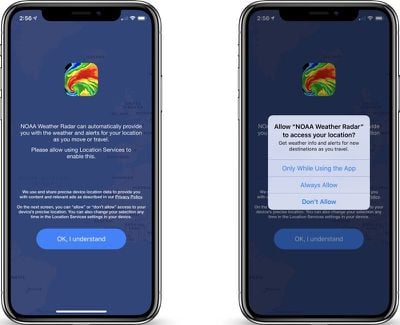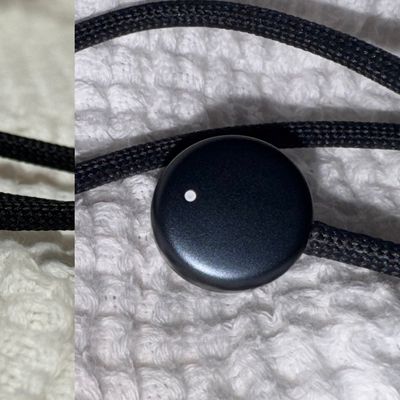Dozens of popular iPhone apps are sharing the location data of millions of mobile devices with third-party data monetization firms, according to a group of security researchers called GuardianApp (via TechCrunch).
The apps in question are mostly news, weather, and fitness apps that require access to location data to work properly, but then share that data to earn money.

According to security researchers, the apps send both precise location and other sensitive customer data to data monetization companies "at all times, constantly" sometimes without customers being aware of the location data collection. The information is used for purposes like creating databases for ad targeting.
Researchers used tools to monitor network traffic to discover apps collecting Bluetooth LE data, GPS longitude and latitude, WiFi SSIDs, accelerometer information, battery charge percentage, location arrival/departure timestamps, and more.
While the apps say that personally identifiable information is not included in the data collection, one of the researchers, Will Strafach, told TechCrunch that latitude and longitude coordinates can provide information on a person's home or work. Many customers who agree to provide apps with location data may not be aware of the extent of the information being collected and shared.
Apps that were found to be collecting location info and sending it to data monetization firms include ASKfm, NOAA Weather Radar, Homes.com, Perfect365, C25K 5K Trainer, Classifieds 2.0 Marketplace, GasBuddy, Photobucket, Roadtrippers, Tapatalk, and more, with a full list available on the site.
The data is being sent to companies that include Reveal, Sense360, Cuebiq, Teemo, Mobiquity, and Fysical. These companies denied wrongdoing, suggested customers were able to opt out at any time, and said that developers are required to inform customers about the data collection.
Some of the apps in question do indeed have clear data collection notices when opening them up for the first time, but data monetization firms do not make sure apps are following disclosure policies and not all do.
"None of these companies appear to be legally accountable for their claims and practices, instead there is some sort of self-regulation they claim to enforce," said Strafach.
iPhone users who want to avoid having their location data shared with data monetization firms should be wary of the third-party apps they install that are using location services. Limiting ad tracking in Privacy settings by going to Privacy > Advertising is recommended.
GuardianApp also suggests users use a generic name for router SSIDs and turn off Bluetooth functionality when Bluetooth is not in use.
























Top Rated Comments
Any app that tries to keep using your location in the background when set to "While Using" will pop up a big blue banner saying "<app> is currently using your location." You can then remove the offending app, or at least kill it. Waze has this issue, but I suspect it's a longstanding bug and not intentional.
The linked article would carry more weight, if it was more than an advertisement for Guardian's new VPN app.
Ironically, the Waze UI is so bad that "just kill the app (and relaunch it from scratch)" is my default technique for navigating through the app.
I've tested and run it on a Raspberry Pi (Raspbian OS), Ubuntu 16.04 LTS on a Dell Optiplex 990 and I've run it in a VM (virtual machine) under Ubuntu in VMware Fusion on a Mac Mini. Currently I'm just using the Raspbery Pi as the DNS server, or Pi-Hole.
All you have to do once set up is to tell your WiFi router/access point and/or firewall to use the IP address of the Pi-Hole for it's DNS. You can also manually set each device, phone, tablet, PC, laptop et al. to point to the Pi-Hole for it's DNS.
Once you get it setup then you can add curated blocklists to the 'gravity service' of Pi-Hole and it imports all those domains on the list into your Pi-Hole for blocking. You can also blacklist and whitelist domains as needed too. There will always be some false-positives or sites that are blocked that you don't want blocked and once you square off those rough edges its smooth sailing.
Here are some sites that I get most of my block lists from:
* https://firebog.net/
* https://blog.cryptoaustralia.org.au/2017/11/15/favourite-block-lists-cryptoaustralia/
* https://github.com/StevenBlack/hosts
* https://discourse.pi-hole.net/t/to-completely-block-facebook-blocklist-facebook-domains/8141
Here is the Raspbery Pi hardware I'm using. https://www.amazon.com/gp/product/B01D92SSX6/ref=oh_aui_search_detailpage?ie=UTF8&psc=1
I'm happy to answer more questions if you have them. I love the Pi-Hole and never want to be on the Internet again without it.
Here is a video on the setup process.